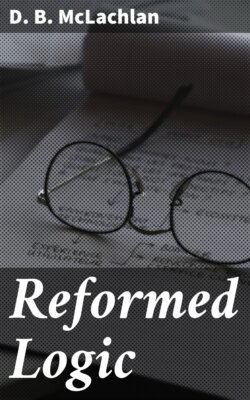Читать книгу Reformed Logic - D. B. Mclachlan - Страница 10
На сайте Литреса книга снята с продажи.
V—TRUTH
ОглавлениеTable of Contents
This word has several meanings which it may be well to notice.
As veracity it means an agreement between our thoughts and our language. It supposes that we take reasonable pains to learn the conventional laws upon which language is founded, and then endeavour as far as possible to bring our speech in conformity with these laws. Since language is an art (like music) it may be acquired well or ill, so that a mistake in the use of a phrase or term is not regarded as untruth. There must be deliberate abuse of language to constitute a lie.
Agreement between an idea of memory and the actual experience—correct recollection—is another meaning of truth.
Also truth may signify agreement between an inferential thought and the fact to which it refers, although the fact has not yet been observed. In this sense truth must be construed liberally. We never foresee a future fact exactly as it will take place. Our anticipations are vague and our preparations for them general, but that on the whole is enough for our purposes. At least it is all that reason affords us. If we are absolutely certain of a future fact and can figure it in the mind precisely as it will take place, that means that it has already occurred so often that we are virtually using our memory, not our reason.
An inference may be considered true if it is the best we can draw from the information at our command, though in point of fact it may prove to be very incorrect.
There is no mass of speculative Truth which everybody ought to possess on pain of being considered foolish or miscreant. This notion, formerly so prevalent, betrays gross ignorance of the nature and function of intellect. It makes intellectual speculation an end in itself. Our ideas must be such as serve the uses of our sentimental or inner soul, and since the sentiments (tastes) of men vary widely, so ought also their intellectual ideas. Though change of sentiment modifies ideas, change of ideas does not modify sentiment. There is therefore no sort of good in uniformity of belief in itself. It is creditable to modern times that men have shaken off the procrustean beliefs of the Middle Ages, and are free to adapt their intellects to their real sentimental needs. The numerous sections into which speculative thought is now broken up, and the frequent changes of theory, are signs of healthy and active sentiment.
In matters of social policy, where large bodies of men have to carry out a single design, uniformity must be attained by persuasion or compromise. But such matters relate only to physical well-being, into which philosophical truth can hardly be said to enter.
This relative and, in the widest sense, utilitarian view of intellectual truth applies both to quantity and quality of ideas. We should not learn what we do not sentimentally require. That is waste of power. Useless knowledge is folly, said both Plato and Aristotle. To mistake knowledge to be the pursuit of man is to confuse the means with the end, says the author of the Bhagavad Gita.
The quality of our ideas must not be good beyond our necessities. If they are, we shall suffer by acting on them. They will land us in circumstances for which our nature is not fully prepared.
If there were an abstract or standard truth, it would be good for every species of being, and no doubt the thoughts of a man are nearer to it than the thoughts of a horse. Therefore a horse ought to be improved by receiving a human intellect. But if we could insinuate into a horse's mind the knowledge possessed by an educated man, we should spoil what may have been a good horse and produce a monstrous and horrible man. So is it with ourselves. If we could receive knowledge far in advance of our requirements or out of relation to them, it would drive us mad or be itself madness. Our constitution and necessities determine what we can know and what we ought to know. Not all possible knowledge is good, and what is good for some may be useless or bad for others. Schopenhauer says well3: 'The faculty of Knowing ... has only arisen for the purpose of self-preservation, and therefore stands in a precise relation, admitting of countless gradations, to the requirements of each animal species.'
